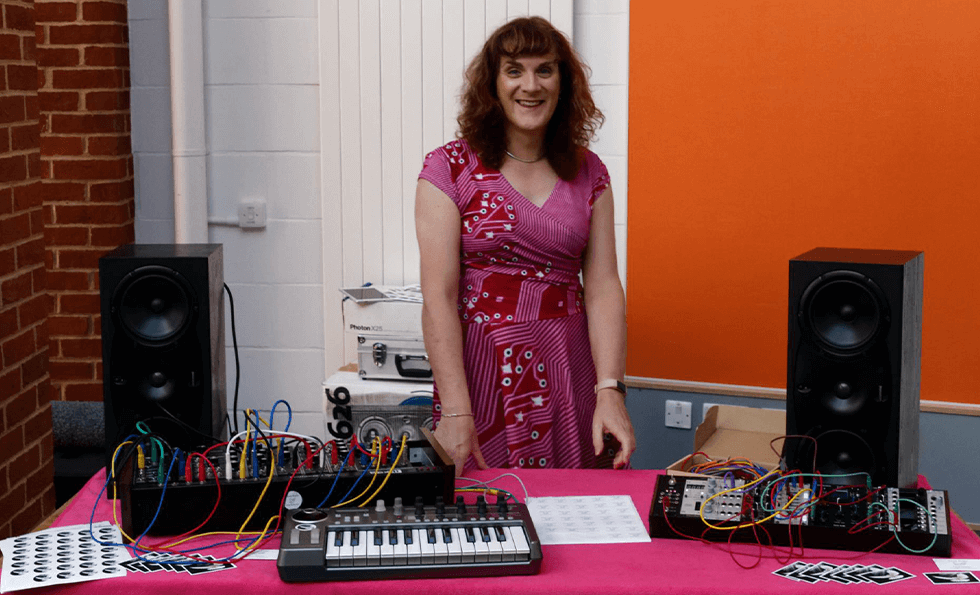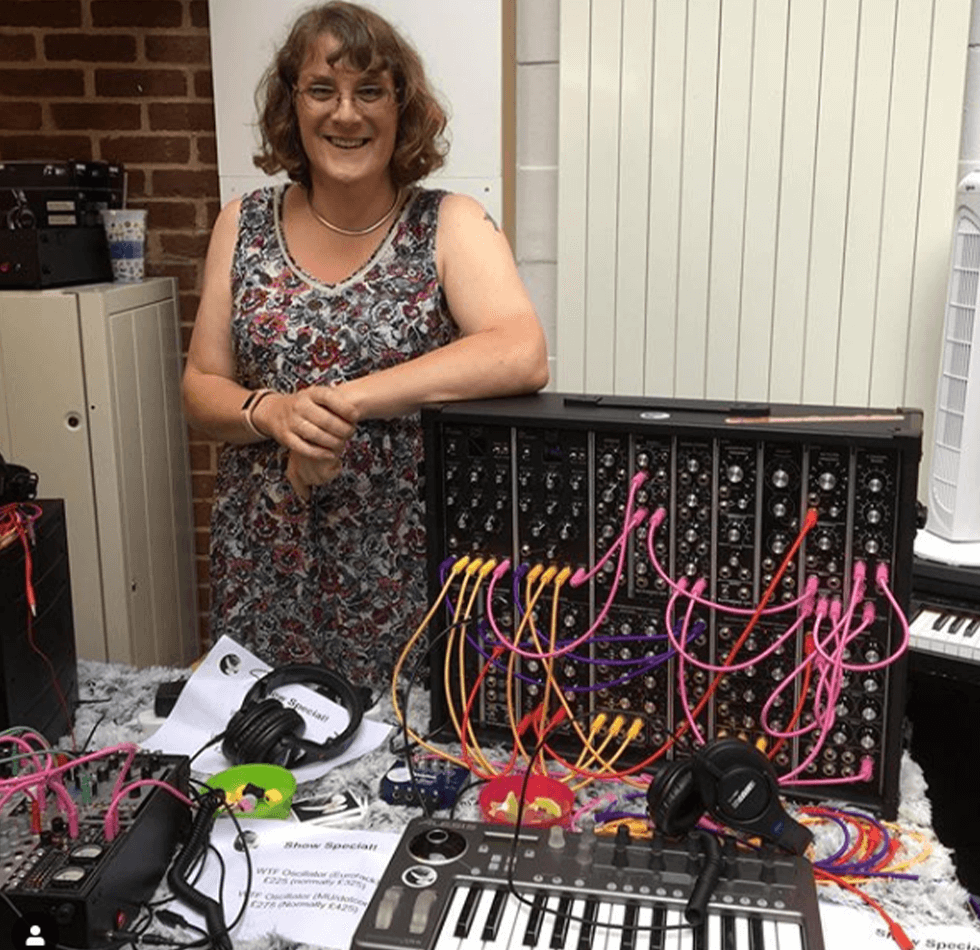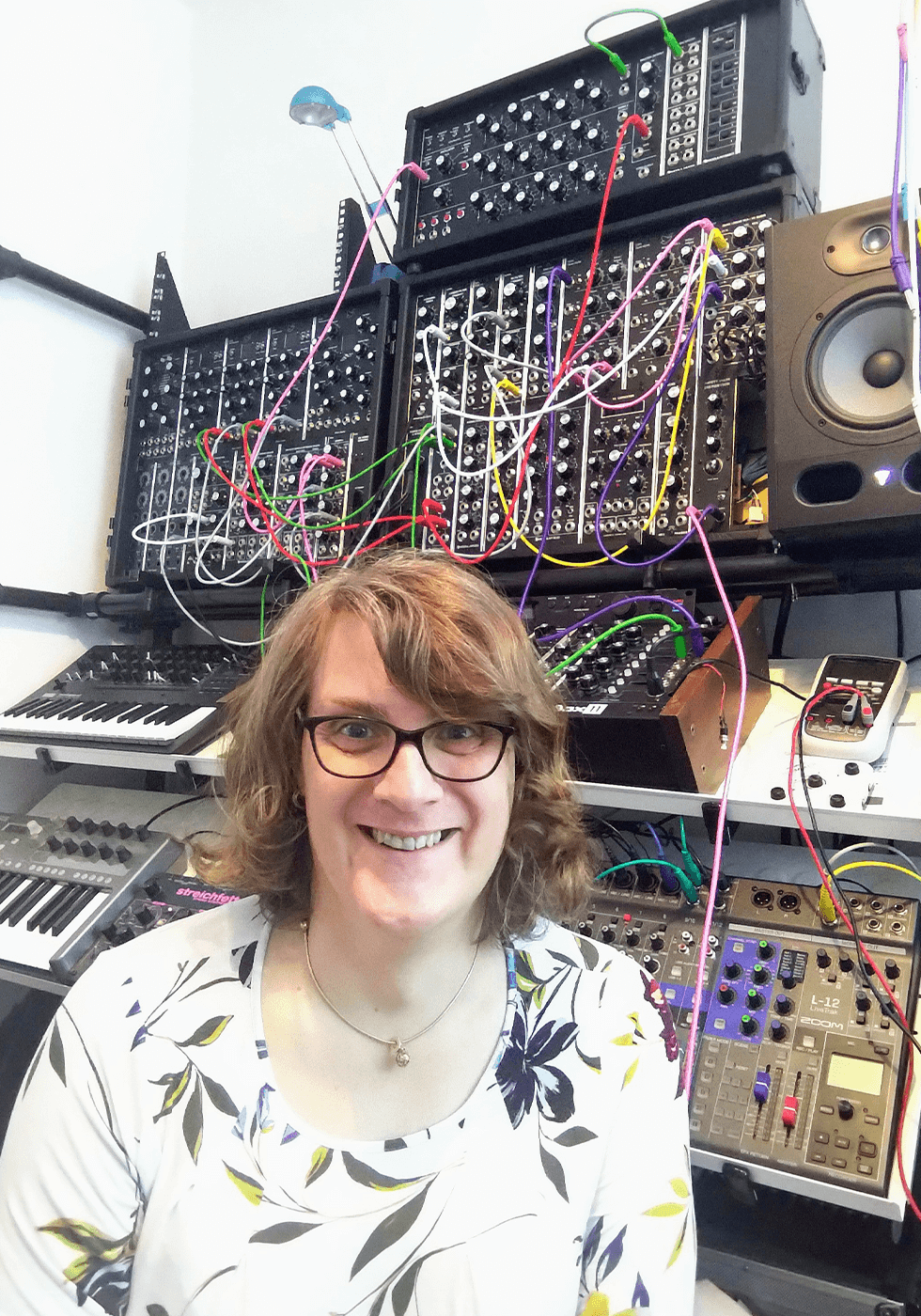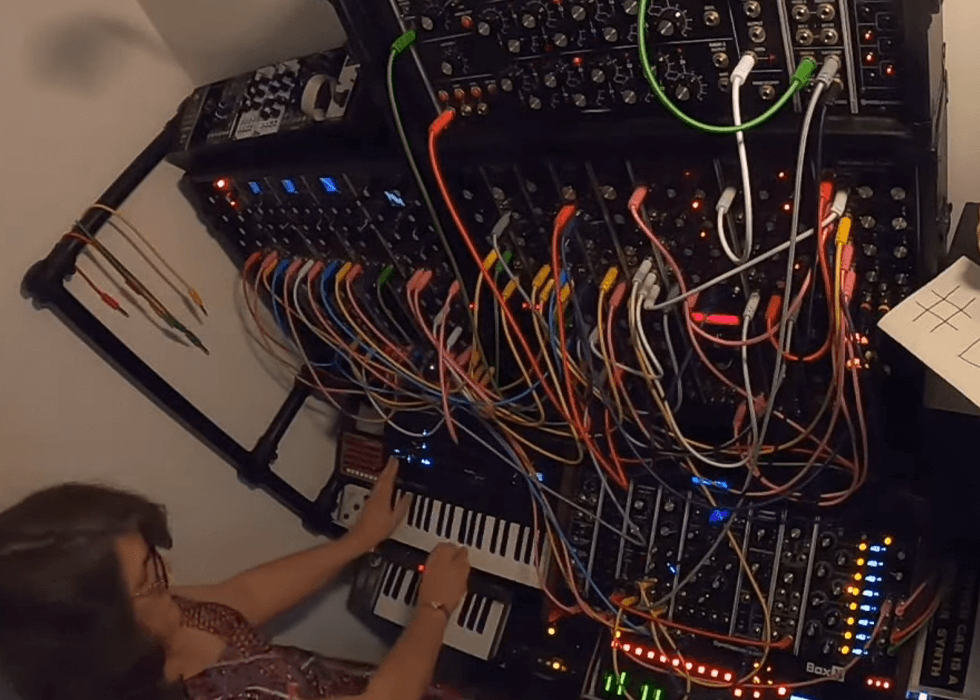Purity, integrity and synthesizers
Unbridled passion drives Paula Maddox as she finds her sound through synth creations.
Captivated by the perplexing synth sounds of the 1980s and driven to recreate the beloved melodies of her favourite songs, Paula Maddox has had a fruitful career in music tech. As a synth afficionado turned designer, Paula has been at the helm of many groundbreaking synth creations, and has also founded her own synthesizer company, Dove Audio. We spoke with Paula to learn more about her career as a trans woman in music tech, and how she infuses purity, integrity and love into her work.
Like many of us, Paula’s teens were a key moment that sparked her love for music. “Music became a passion for me when I was around 13 or 14, back in the ‘80s,” says Paula. “By this time, I was already interested in electronics. I had built some kits and done some television repairs, back when you still could repair them. But a friend played ‘Tangram’ by Tangerine Dream for me one day and I was transfixed. The sounds I was hearing were unlike anything I had heard before. Sure, I'd hear pop music of the early ‘80s and synth bands like Depeche Mode, but this was something different. There was an ‘edge’, a ‘purity’ if you like, to the sound. I soon discovered that a major part of the ‘sound’ that I liked was the PPG Wave synthesizers. I quickly found other bands that used them and that was it – I was hooked on ‘that sound’. Something that went beyond regular sawtooths and squarewaves, something rich, intense, and dynamic.”
After becoming transfixed by the synth sounds of the early ‘80s, Paula soon fell into the world of tech and began making synthesizers of her own, looking to recreate that enticing sound that sparked her musical journey. “In the late ‘80s, I lost myself to the computer industry, all the while I was still tinkering with electronic circuits,” explains Paula. “In the early 2000s, I had some time off work following some emergency surgery and I built a modular synthesizer based on various bits I had found online and in various forums. I adapted them and shaped them to try and find that sound, the first was a VCO with digital waveforms that I christened the ‘PPG VCO’. I had finally found that sound I loved.”

Paula quickly began developing more synths, and new instruments that would soon spark a love for music and song craft in other musicians. “Soon after came the Monowave, a two oscillator monosynth with 256 digital waveforms, a unique resolution lowering option and a transistor ladder filter. It sounded huge and was well received. After that came many other projects, all leading up to my co-founding of what is now Modal Electronics in 2013. The Modal 002 synth was the realization of my dreams, 12 voices, transistor ladder filter, lots of great features and some cutting-edge features, for example, updating from the internet.”
Following a nervous breakdown from overwork, Maddox left Modal, but couldn’t be kept away from her love of synths for long. “A few years later, I created a new type of oscillator and showed it to my friends. After running a successful Kickstarter to fund its production, this helped to launch Dove Audio.”
With Dove Audio, Paula’s own synthesizer company, she was able to continue expressing her love for synthesized sounds and innovative tech creations. “For me, creation of synths comes from thinking outside of the box. I'm not a fan of reinventing the wheel, I can appreciate how people would like a modern PPG or Minimoog, but where's the creativity? Where's the evolution? Where's the passion?”
With such strong conviction behind the importance of passion in her synth creations, Paula takes a similar approach to running her business.“I think the only way to run a business is to be open and honest. Not all businesses do that. I think that your customers really appreciate it, especially musicians. Music is about a passion, a connection, and a love for creation. You need to be able to be honest with people you work with. Fobbing people off with weak excuses won't cut it when the people you're working with are creative, passionate souls.”
Driven by passion
The love of the instrument is the core driver of Paula’s endeavors. “There is no point in creating an instrument for the sake of money, you have to make an instrument that helps spark the creativity in people,” says Paula. “I make instruments because I love making instruments. Much like a luthier makes a guitar, it's something I'm incredibly passionate about and I believe if you have that passion and belief in your work, it shows. I've met some amazing people and you can tell that what drives them is their passion, their pure unadulterated love of music. I share that passion with the creation of my synthesizers, and I want to help musicians translate their passion and their love into sound and music.”
"I want to help musicians translate their passion and their love into sound and music.”
Paula’s creativity in synthesizer design may seem like a different world from the more conventional ideas of artistic self-expression, but it seems that the ethos is still the same. No matter the medium, bringing your individuality to your work is key. “Being able to be myself, and finally having the courage to accept myself has let my creativity really bloom,” explains Paula. “Like my projects, I'm quirky, slightly off the wall and once you know me you don't forget me. I think being able to share that love of what you do is key. If you truly love what you do, it shows, and people feel that in your products. I feel quite strongly that this is something a lot of synthesizer companies forget – music is about passion, not making mega bucks. You have to love what you do; the rest will follow.”
Once Paula was able to be free with her trans identity, her work blossomed as she did. “I'm simply myself, my history is all over the internet and I'm not ashamed of it. There were people who wanted me to keep things under wraps for fear of losses to profits, but they forget that the music industry is a creative one, one where you can express yourself. After all, that's what music is – expression. Everyone I've met has been utterly fabulous and I've had very few problems. The majority of people online have been incredibly supportive. Those that have caused problems, or rather have tried to cause problems, I'm not bothered about. After all, you wouldn't stop making music because someone said your hi-hat was too low in a mix, would you? You do you, be yourself because nobody else can do that better than you. Follow your passion and your dream.”

Challenging convention in music tech
In such male-dominated fields as audio engineering and technology design, Paula has had unique first-hand experience of the very disparate ways that men and women are treated within the industry.“Sadly, I feel that a lot of the engineering side of the industry considers women and trans women not as good as men, which is a terrible shame,” says Paula. “It's largely historic and completely unfounded. Look at some of the utterly amazing women in STEM (Science, Technology, Engineering and Mathematics). Ada Lovelace, Hedy Lamarr, Grace Hopper, Katherine Johnson, Radia Perlman, Sophie Wilson, Lynn Conway and many more.”
“These are women helped to shape the modern world and without them there wouldn’t be things like WIFI, ARM CPUs, programming languages, VLSI and much more. Women are as creative as men, but having been both sides of that equation, women are still sadly treated as second class citizens in the engineering world.”
It might seem like there are very few areas in the music industry where there is support for women and trans women, however Paula has been fortunate to find a supportive community within the industry that allows her to continue creating spectacular synths and embraces her trans identity.“There are many areas of the industry that I feel supported by. Customers are great, some online synth groups and mail lists. Sadly, there are still a few places on the internet rife with misogynistic people and comments, even site names, so I avoid these. I try and keep myself to myself and focus on what I love doing, creating musical instruments for musicians. I have a few friends that I keep close, some are industry professionals, some are hobbyists and some are industry tech people.”
On the other hand, there still needs to be a lot more work done for the music and tech industries to be a welcoming creative environment for people from all walks of life. “I think it's a huge shame that we're in the 21st century, and we've got the incredible power of the internet, but there is still such a long way for humanity to go in terms of acceptance of peoples differences, be that their sex, gender, race, religion or anything else,” says Paula. “We're all people, we all have feelings, we all want to feel loved and respected, so why is it still so hard in this modern age? It's not all bad, though. The internet has brought many communities closer together and enabled support networks crossing borders and countries around the world.”
“We're all people, we all have feelings, we all want to feel loved and respected, so why is it still so hard in this modern age?"
It goes without saying that LGBTQ+ representation in music tech needs improvement, and Paula’s experience as a trans woman in this industry has informed a lot about her thoughts on how it can begin to change. “There are lots of things the world could do to improve. Stop pointing out people’s differences and start embracing them. For example, I saw a recent YouTube video about ‘showing a noob woman my synth’. I mean, why point out that she was female? You wouldn't say ‘showing a male noob my synths’, would you?”
"Stop pointing out people’s differences and start embracing them"
As a trans woman, Paula has unfortunately experienced transphobic prejudices throughout her career in music tech.“With transgender people, you often see people referring to Wendy Carlos by her former name, for example, and trying to make a joke out of her transition, this has happened to me too.” Maddox strongly believes that acceptance of people’s differences, rather than making a spectacle of them, is key in normalising the differences of identities, and allows people to be more inclusive once we accept this fact. “Music is all about creativity, if you pick out cookie cutter white middle-aged people in suits, things are going to get stale very quickly. Embrace the differences,” says Paula. “Just treat people as people, be they White, Black, Asian, gay, straight, genderfluid or trans. If someone feels comfortable in a dress, be they male, female or nonbinary, then let them. It's part of what makes us all unique. We need to embrace this uniqueness more and stop trying to pigeonhole people. As someone once said, ‘labels are for clothes, not people’.”

The young teenager whose life was set alight by the sound of synths in the early ‘80s has come a long way and experienced many changes both in career and in identity. As Paula looks back, her powerful belief in passion and existing as your authentic self still resonates strongly.“If I were to give a younger me advice, it would be simple: ‘listen to your heart, you're stronger than you realize, believe in yourself and follow your passion’. I wasted so many years trying to be something I'm not, trying to ‘fit in’ and trying to be the levelheaded career-focused person that a large portion of society expected me to be. I'm not that person – I'm creative, I have passions, I have a soul, I have a purpose in life.”
"Listen to your heart, you're stronger than you realize, believe in yourself and follow your passion."
Now, Paula herself is a visible example of the brilliant and unique different voices in the music tech world and inspires new young minds to take the step towards their own dreams despite their perceived differences. “I like to think that I help others realize that you can be yourself in the music industry by being unashamed of my past,” explains Paula. “Yes, I know my previous name was Paul. Yes, I know that I was once male, or at least I tried to be, and I know that I don't sound female. I don't hide any of that, and I would never pretend it didn't exist. I want people to realize that you can be your true self and still be a creative person, someone who is able to enjoy life and share their passion.”
Paula Maddox celebrates her identity as a trans woman by embracing all the parts of her past as part of her present self. “Life is for living, not for hiding yourself away. To quote Cyndi Lauper, ‘some boys take a beautiful girl and hide her away from the rest of the world, I wanna be the one to walk in the sun’. So don't be ashamed of what society may perceive as a difference, embrace it. Be yourself. Create your music in your way, because nobody else can make your music, your synths or your art. Only you can, and that is so very precious.”

"Don't be ashamed of what society may perceive as a difference, embrace it."
WORDS: ZAINAB HASSAN
